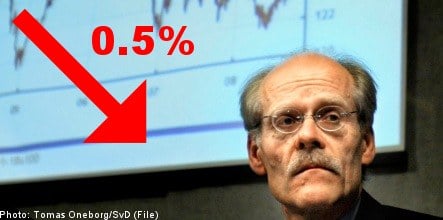The lower interest rate and interest rate path are necessary to dampen the fall in production and employment and to attain the inflation target of 2 percent.
The repo rate is expected to remain at a low level until the beginning of 2011, the Riksbank wrote in a press release on Tuesday.
The Riksbank wrote that the economic downturn is worsening and the fall in global economic activity has hit Sweden hard with exports significantly down towards the end of last year.
The labour market has deteriorated further and household consumption is weak, the Riksbank concluded, revising its previous forecast.
“The outcomes and confidence indicators published in recent months point to the economic downturn being even deeper than the Riksbank had forecast in February.”
The Riksbank informed that there is “some probability of further cuts in the future” but warned that “when the repo rate is at such low levels, one must consider the fact that this could have negative effects on the functioning of the financial markets.”
But there were some signs of optimism in the Riksbank’s comments. The weaker krona will stimulate the economy and “positive but low growth” was forecast for 2010.
It is reported that the Riksbank board members were not united in the decision to cut rates by 0.5 percent with Lars E.O Svensson recommending a larger cut, down to 0.25 percent.
The Riksbank forecast that rates would rise to 0.8 percent in the first quarter of 2011 and rise to 3 percent by 2012.



 Please whitelist us to continue reading.
Please whitelist us to continue reading.
Member comments